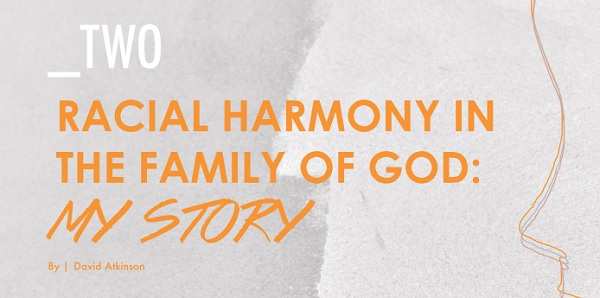Racial Harmony in the Family of God: My Story
By David Atkinson

Ever since I could remember, I’ve been going to church. I knew about gospel choirs and sermons that ended in the pastor shouting about Jesus’ death, resurrection and salvation. When movies depicted Black churches, I felt qualified to judge their performance against the real thing.
I was and still am grateful to God for my Black Baptist upbringing. It taught me that Jesus’ death in my place paved the way for salvation by faith. I also learned the lesson that Christian discipleship includes both defeating sin in our lives as well as social injustices where we have influence (Galatians 6:10, Proverbs 31:8). I would later learn that churches with a lot of legal and cultural power in America had trouble keeping both of these realities together. It’s either conservative theology and politics or liberal theology and politics. No mixing.
My College Experience
When I arrived on my liberal college campus, I settled into my college Christian fellowship. It was my first experience in a Christian setting that wasn’t majority Black. I noticed our commonalities quickly and didn’t think much of it. This was college, after all, so I was ready for new experiences.
I continued in the fellowship and ended up doing a summer missions trip with this group. I experienced God’s power in a new way. I saw lots of conversions to the faith, experienced encouragement from fellowship and learned from Christians of different backgrounds. It was here that John 17:20-21 was impressed upon me:
"I do not ask for these only, but also for those who will believe in me through their word, that they may all be one, just as you, Father, are in me, and I in you, that they also may be in us, so that the world may believe that you have sent me" (John 17:20-21, ESV).
I saw that summer how our unity coincided with and powered our witness. Yes, we were all college students. But we weren’t in a cultural club. We were there because Jesus was the glue that bonded us. I think this brings God glory and shows to a watching world (and church) that Jesus really is the Savior of the world.
Knowledge Puffs Up but Love Builds Up
In my studies, I’d also learned that the disunity of humanity manifested in different languages came as a punishment for uniting in godless pride (Genesis 11) and that Jesus came to reconcile all people to himself and each other (Ephesians 2:11-22). Before Peter’s first sermon, Jews from all over returned to Jerusalem and began praising God in all sorts of languages, indicating that God was finally reconciling all people back to himself in Christ (Acts 2:1-13). I even learned about the commands and counsel on how Christians of different religious and cultural backgrounds can worship together in the same church (1 Corinthians 10:23-33, Roman’s 14:13-15:7). To top it off, I discovered that Revelation 5:9 shows that God will ransom people from “every tribe and language and people and nation.”
The issue was what to do with this info. It became painfully clear that most churches (Black, Chinese-American, Latino, Korean-American, etc.) wanted to remain in their bubbles. White churches seemed to be inviting, but their approach to church tending to frame justice and justification by faith as being in tension always annoyed me. Do I have to balance these? I felt if I was willing to get out of my comfort zone of the Black church and go into evangelical spaces, surely others who’ve had less oppression from the evangelical church should be able to do the same.
The Barrier of Black Pain
It’s true. Along with indigenous Americans, Black people have been persecuted severely by the American evangelical church. In 1667, Virginia’s General Assembly (made up of Anglican men) broke with the English Christian tradition of Christians not enslaving one another to declare “… that the conferring of baptism does not alter the condition of the person as to his bondage or freedom.” [1]
After America’s Revolutionary war, former slave Richard Allen began the African Methodist Episcopal denomination after being threatened to be forcefully removed from a pew reserved for white parishioners. [2]
And although it is reforming, Billy Graham’s magazine, Christianity Today, once published an article defending segregation: "The essential point is that the people who must live in the situation are convinced, for reasons sufficient for them, that integration will be destructive of their society, ultimately evil rather than a good" [3] .
These snapshots are just tips of the iceberg of anti-Blackness in America’s evangelical church. There’s a reason why most Black people worship in majority Black churches, and it’s not mainly about music. It’s about majority culture churches training their members to be woefully ill-equipped to repair the damage their tradition has done.
And yet, in my focus on reconciling with White churches, I missed out on the fact that I was contributing to church division by overlooking Asian-Americans.

I Didn’t Know
Rewind back to college:
“Finally, Asians on TV!” my friend shouted with relief and excitement during a Superbowl game. Our college Christian fellowship had become increasingly Asian-American over the years, but I still remember recoiling a bit. Asians are already on TV, right? I thought. I mean there’s MC Jin, that guy from that Saturday morning show (I was thinking of Donte Basco), and… Rush Hour!
Still a bit confused, I got the hint that my confusion was indicative of what I’d later realize: our campus fellowship was not as unified as I thought it was.
I had understood that applying the gospel to personal sin and systemic injustice were Christian issues, but I had no idea about applying the gospel to shame, extreme marginalization from American culture or living wisely with competing “American” and “Asian” expectations. And I assumed that Asians’ silence on these important issues meant that nothing significant was being overlooked.
How are we going to be unified for God if this is the norm?
Listening
In an effort to love and build relationships with Asian-American believers, I asked some of my Asian-American friends for their suggestions:
Amber Ma is a friend who works in the healthcare industry.
What is your ethnic background?
Chinese-American
How can we reflect God’s diverse kingdom as opposed to cultural confusion and animosity?
Having open, inclusive, non-threatening spaces to discuss points of tension in the church and difficulties felt by individuals across the spectrum would help. This needs to be well facilitated by leaders aware of the communication dynamics and differences across cultures (i.e. many Asian-Americans need to be asked, rather than expected to speak up). We also need leadership to be cognizant of these cultural nuances and how they are expressed in communication, theological perspectives, etc. This is true even for Asian-Americans or other “X ethnicity” people born in America, who often subconsciously carry the norms and expressions of their cultures. If not addressed or recognized by the right level of sensitivity, it can lead to confusion or tension in the community.
Scott Yi is a Pastor at International Alliance Church in Providence, RI.
What is your ethnic background?
Korean-American
How can we reflect God’s diverse kingdom as opposed to cultural confusion and animosity?
Asian-Americans should be encouraged to speak in their own unique voices given them by the Holy Spirit. Raised in a deferential culture, most Asian-American Christians are implicitly taught to reject their own leadership potential and pay respect to established authority structures. Sadly, they don’t realize that their deferential mindset and culture of humility are actually some of the BEST reasons why Asians should be leaders today.
Sheryl is a student in medical school.
What is your ethnic background?
Filipina-American
How can we reflect God’s diverse kingdom as opposed to cultural confusion and animosity?
When you encounter micro-aggressions [4] throughout the workweek, it’s human nature to want to be around people who understand us, people like ourselves — which doesn’t promote diversity. Many people cannot separate their feelings (e.g. threatened by minorities/losing majority status) from their thoughts and behaviors (e.g. voting for someone who reduces that fear rather than an objectively more experienced and trustworthy candidate). It’s easier to blame others for uncomfortable feelings rather than develop the empathy to weather through temporary discomfort in order to gain understanding of another person’s thoughts and concerns. So, to promote diversity, developing patient empathy and courage to step outside of our comfort zone (at least on weekends!) — with both realism and hope for better understanding — can be a start for both minorities and White people.
Leaning on God
While I have been trying to implement the answers of my friends, unfortunately, I don’t have the results I was hoping for. I have longed for and experienced some Christian unity. I have also seen and appreciated the spiritual comfort and help that comes from ethnic specific congregations.
I know one day I won’t have to choose. And neither will you. That’s my hope.
References
[1] Tisby, Jemar, The Color of Compromise (Zondervan, 2019), 25-26.
[2] Tisby, Jemar, The Color of Compromise (Zondervan, 2019), 53-54.
[3] https://www.christianitytoday.com/ct/2018/december/where-we-got-it-wrong-segregation-apology.html
[4] Micro-aggressions are small-scale offensive remarks. One example is complimenting Asian-Americans on their good English, as if the assumption should be they can’t speak English well. Another example is asking Asian-Americans where they’re really from, as if having Asian heritage means they are not really American.


